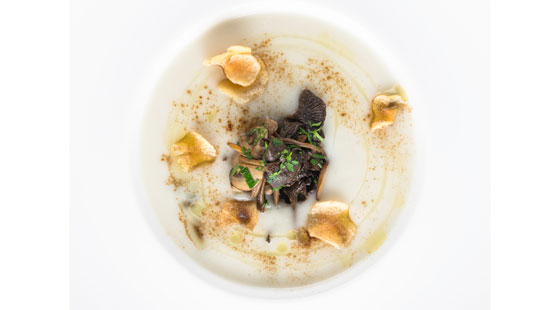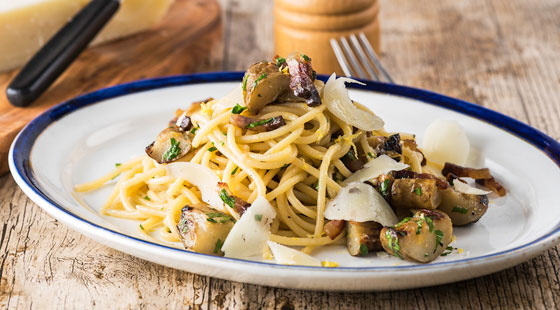Home-grown harvest: Jerusalem artichoke
These earthy tubers have a distinctive flavour and lend themselves to a range of recipes, from a velvet-textured soup to crunchy deep-fried crisps, says chef consultant Russell Brown
The Jerusalem artichoke is an unusual vegetable inasmuch as it seems to be loved by chefs but little used by the general public and not very often seen in the shops.
Perhaps it is because it is fairly unattractive and has a reputation for causing excess wind.
The main starch contained in the tuber is inulin, which cannot be digested by the body.
However, when the tuber is stored, the inulin breaks down into a single molecule of glucose and a chain of fructose, which can be absorbed by the body.
The name Jerusalem is thought to be a corruption of the Italian 'girasole', and the artichoke part is from the taste of the tuber, as noted by French explorer Samuel De Champlain, who sent the first samples to France.
The Jerusalem artichoke is also known as the sunroot, earth apple and sunchoke - the latter a name that was invented in the 1960s by Frieda Caplan, a Los Angeles food wholesaler, to try and invigorate the market.
The main season for Jerusalem artichokes in the UK is October to March and the tubers store well unharvested. Once lifted, they will keep well in the fridge for a couple of weeks.
Different varieties will be more or less knobbly, with the smoother types producing less waste when peeling.
The flavour profile is very distinctive, with sweet, nutty notes and an underlying earthiness.
It is a dominant flavour and perhaps best used in small quantities or in combination with other vegetables - as a gratin, for example.
A 50/50 mix with potatoes works well. The tuber can be eaten raw in salads and has a texture similar to water chestnuts. For cooking, the options vary from deep-frying as crisps to cooking sous vide for purées.
George Blogg, head chef at the Michelin-starred Gravetye Manor in West Hoathly, Sussex, is a big fan: "We grow them in the kitchen garden. They are a brilliant crop as they store underground until March - the gardeners just dig them up as we need them."
Artichokes are on Blogg's menu with sea bass, confit chicken wings, trompettes, gremolata and chicken jus. Blogg boils them in their skins, then scrapes out the flesh to crush with butter or into a purée. The skins are then deep-fried to make a crispy garnish. Boiling them in the skins means you don't have to worry about the artichokes discolouring. If you do peel them, place them in water with some lemon juice or vinegar to prevent discolouration; however, this can affect the taste.
Paul O'Neill, Roux scholar and head chef at Berwick Lodge in Bristol, uses artichokes in three ways in a starter of caramelised artichoke purée with pickled and dehydrated artichoke, truffle curd and blue cheese crumb.
Hayden Groves, executive chef at Baxter Storey, particularly likes Jerusalem artichokes as a caramelised purée. He dices 600g of scrubbed artichokes with the skin on and sautés them in 100g of butter for three minutes.
They are then seasoned and roasted for 25 minutes at 190ºC. Then, 60g of water is added to deglaze and the mix is puréed with 30g of cream and a few drops of lemon juice. This preparation was part of a dish Groves cooked when he won the Craft Guild of Chefs National Chef of the Year final in 2013.
Jerusalem artichoke soup with wild mushrooms and artichoke crisps
Serves 6
For the soup
2 sticks of celery, finely sliced
2 large banana shallots, finely sliced
1kg Jerusalem artichokes
Olive oil
Maldon sea salt
Double cream to taste
In a heavy, wide-bottomed pan, soften the shallots and celery in a generous amount of olive oil. Peel and finely slice the artichokes - cut them as thinly as you can. Add to the pan and season lightly with salt.
Continue to sweat the vegetables until they begin to soften, then cover with water and bring to a simmer. Cook until the vegetables are completely soft. The time this takes varies, but it will be approximately 20-30 minutes.
Transfer the contents of the pan to a blender, in batches if necessary, and process until completely smooth. Add a touch of double cream and season. Pass through a fine sieve and either chill or keep warm if using immediately.
The seasoning is really key in this recipe. Keep adding salt until the maximum flavour is achieved, but make sure the soup doesn't taste salty.
For the crisps
4 small artichokes, peeled and thinly sliced
Oil for deep frying
50/50 blend of finely ground Maldon sea salt and cep powder for dusting
Dry the artichoke slices on kitchen paper and then deep-fry in small batches at 160ºC until they are a pale golden brown. Drain on kitchen paper and season with the salt mix.
For the mushrooms
2tbs olive oil
1 clove garlic, smashed
200g mixed wild mushrooms
20g unsalted butter
1dsp chopped flat leaf parsley
Maldon sea salt and fresh black pepper
Heat the oil in a heavy, non-stick pan and add the garlic clove. Allow the garlic to brown in the hot oil and then press down on it well. Remove the garlic clove. Sauté the mushrooms in the pan over a high heat until they just start to colour
and crisp, and then finish with the butter and parsley, seasoning to taste. To serve, pile a portion of the mushrooms in the centre of a bowl. Carefully pour the soup around them and then garnish with the crisps.
Spaghetti with roasted Jerusalem artichoke, guanciale, lemon and parsley
Serves 4
For the pasta
250g Jerusalem artichokes
2tbs rapeseed oil
Maldon sea salt
Freshly ground black pepper
400g dried spaghetti
150g guanciale lardons
1 clove garlic, finely sliced
200ml chicken or vegetable stock
2tbs lemon juice
Zest of 1 lemon
1tbs flat leaf parsley
To serve
Pecorino Romano shavings
Wash the artichokes thoroughly, scrubbing well to remove any soil. Cut them into quarters lengthwise and place in a small roasting tin. Toss with the rapeseed oil, season well and roast in a preheated oven at 180ºC for 15 to 20 minutes. Turn and baste frequently.
Bring a large pan of water to the boil, add salt and cook the pasta for 8-10 minutes until al dente. In the meantime, cook the guanciale lardons in a heavy sauté pan until golden and the fat has rendered.
Remove the artichokes from the oven and slice into 1cm pieces. Add to the guanciale along with the garlic. Cook for a few minutes and then tip the pan contents into a sieve over a bowl. Return the pan to the heat, add the stock and lemon juice and reduce by half.
Using tongs, transfer the pasta to the stock and cook for one minute. Add the guanciale and artichoke mix to the pasta, grate in the lemon zest and add some of
the drained fat from the guanciale. Season to taste and finish with flat leaf parsley.
Divide the pasta between serving bowls and scatter the Pecorino over the top.
Buying and storage tips
•Tubers should be hard and free from cracking
•The smoother the tuber, the less waste will be generated when peeling
•Store tubers in the fridge, loosely covered with a damp cloth
•Tubers that have been stored for a time will be sweeter
Market report
The main season for Jerusalem artichokes runs from October to March, when both the English and French products are available. Summer imports are best avoided. Look for a bright skin with a fresh and full appearance and expect to pay around £1.75 per kg.
Charlie Hicks
totalproducelocal.co.uk
Save
Save












